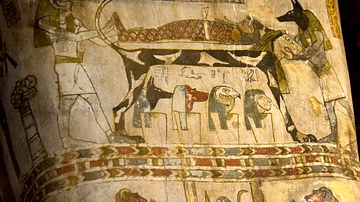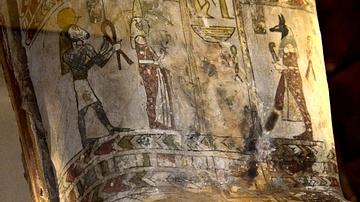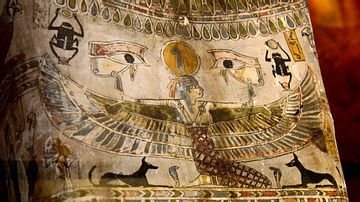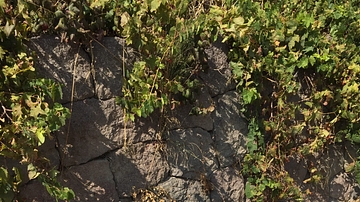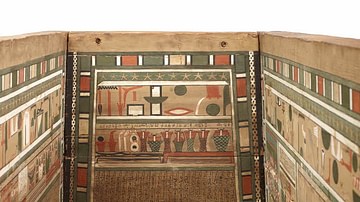Illustration
The mummy is that of an adult female with her arms crossed over the breasts. X-rays have revealed that the body has suffered post-mortum mutilation; both the hands and feet are missing and dummies made of linen have been substituted by the embalmers. A mask, amuletic collar, and apron of painted cartonnage have been placed over the outer wrappings. The coffin reproduces the appearance of the mummified body. Such anthropoid cases were originally intended to serve as alternative dwellings for the spirit, in the event of the body itself is being destroyed. In addition, through their form, coloring, and iconography they helped to identify the deceased symbolically with the god Osiris. The surfaces of the coffin of Diefiawet were covered with painted scenes and hieroglyphic texts to assist and protect her passage into the afterlife. Isis and Nephthys, the sisters of Osiris, protect the head and the foot of the mummy, and goddess Nut spreads her winged arms over the breasts. A series of gods arranged along the sides of the case provide additional divine protection. The inscription in the center of the lid begins with the parentage of Diefiawet, who was the daughter of a temple doorkeeper. They continue with the full text of Chapter 89 of the Book of the Dead, a magical spell to ensure that the Ba (spirit) should be united with the body after death. From Egypt; precise provenance of excavation is unknown. The coffin dates back to the 26th Dynasty, 664-525 BCE, while the mummy dates back to the Ptolemaic period, 305-30 BCE. (National Museum of Ireland-Archaeology, Dublin, Republic of Ireland)
About the Author
Cite This Work
APA Style
Amin, O. S. M. (2015, December 18). Coffin of Diefiawet contaning a Ptelomaic mummy. World History Encyclopedia. Retrieved from https://www.worldhistory.org/image/4308/coffin-of-diefiawet-contaning-a-ptelomaic-mummy/
Chicago Style
Amin, Osama Shukir Muhammed. "Coffin of Diefiawet contaning a Ptelomaic mummy." World History Encyclopedia. Last modified December 18, 2015. https://www.worldhistory.org/image/4308/coffin-of-diefiawet-contaning-a-ptelomaic-mummy/.
MLA Style
Amin, Osama Shukir Muhammed. "Coffin of Diefiawet contaning a Ptelomaic mummy." World History Encyclopedia. World History Encyclopedia, 18 Dec 2015, https://www.worldhistory.org/image/4308/coffin-of-diefiawet-contaning-a-ptelomaic-mummy/. Web. 19 Apr 2025.




